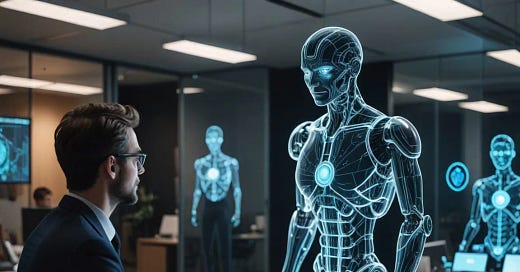The Future Workplace
It's 2032 and you are setting up your new business using just a bundle of AI agents you've acquired online.
When the computer made its way from a large mainframe accessible only to specialized personnel, onto the desks of every business, big or small, it meant a huge leap in productivity for everyone involved. Typewriters were replaced with word processors editing documents more efficiently and reducing the time needed to retype entire documents. The introduction of spreadsheets to automate calculations and financial reports simplified managing budgets, payroll and business forecasts. File cabinets used to store customer records, inventory, and business transactions were replaced by database software and the mail room was replaced by the mail server.
A lot of jobs became obsolete or evolved following this silent technological revolution. For example, typists, who were responsible for manually typing documents on typewriters evolved into secretarial roles which involved more complex administrative tasks. Inter-office couriers, however, delivering physical documents between departments, were completely eliminated by email services. Sharing the same fate were the switchboard operators who were replaced by the digital phone systems.
Being in the midst of things, we might not be aware that a similar revolution is happening again right now. AI is augmenting many of the tasks we do today, but similarly to what happened in the 1980's with the advent of the PC in the business world, some jobs will be displaced and some will evolve.
AI can not only augment our abilities to perform more in less time, but can also act as a worker on its own through agents. AI agents are computer programs designed to perform tasks on their own. Given an objective, they will use a combination of data, algorithms and ML processes to make decisions and carry out actions. The more they interact with data or perform tasks, the better they become at making decisions. For example, an AI agent managing your email might learn to prioritize important messages over time based on your habits.
So the more we delegate to our AI agents, the more proficient they become at their tasks. Our roles will be less about performing the task but more about formulating the requirements that feed into the AI agent. The future of work might be a handful of human employees managing fleets of AI agents. These agents will take on roles once held by people: assistants, accountants, legal advisors, business analysts, support agents, translators and more.
An IT support manager could oversee AI agents, each specializing in a specific domain: ERP systems, desktop support, network or infrastructure. These agents would work independently to achieve their tasks but could also collaborate to fix common issues, work on projects together and report back to their human managers for direction.
A legal manager might supervise AI agents tailored to different branches of law, like commercial or civil. These consultants trained on specific branches would be able to do triage and even initial advisory, pending human intervention for any legal decision making.
At some point we might even create ourselves AI alter egos—digital counterparts that represent us in meetings we can’t attend, negotiate on our behalf, resolve issues, and even handle parts of our workload.
Looking deeper into the technical landscape ahead, the transformation of workplace systems mirrors the shift from mainframes to personal computers, but with significantly more complex implications.
From an architectural standpoint, the next decade will likely see a fundamental shift in how workplace systems are designed. Traditional application stacks will evolve into autonomous services capable of self-optimization and dynamic resource allocation. These systems will require sophisticated error handling mechanisms and comprehensive audit trails – not just for compliance, but to maintain transparency in an increasingly automated environment.
The implementation of AI agents introduces particular technical challenges that extend beyond current system architectures. These agents will need to operate within carefully defined boundaries while maintaining the flexibility to adapt and learn. The infrastructure must support distributed processing, manage state synchronization, and handle conflicts between multiple autonomous agents operating in the same environment.
Consider a future enterprise system where AI agents handle various aspects of operations. The technical framework must support not just the agents' individual functions, but their interactions as well. Each agent represents a potential point of failure or security vulnerability, requiring robust verification protocols and carefully designed fail-safes.
The security implications alone represent a significant development challenge.
How do we verify the identity of an AI agent?
How do we enforce appropriate access controls?
How do we maintain comprehensive audit trails while respecting data privacy requirements?
These questions will shape the development of workplace systems in the coming years. The challenge lies not just in creating these systems but in ensuring they operate reliably.
We know that generative AI can “hallucinate” when attempting to provide an answer it doesn’t actually know. Now, imagine autonomous AI agents, hell bent on achieving their objectives, without adequate guardrails to prevent them from performing illicit tasks.
The workplace of tomorrow will require a fundamental rethinking—not only of how we design and implement technical systems but also of workplace relationships. Human-to-machine interaction could take precedence over human-to-human interaction, as workers may achieve more by leveraging AI resources instead of human resources.
A single human worker could manage an entire department of AI bots from a single computer screen. Entire companies could be spun up overnight with just one human: the owner.
The technical challenges ahead are significant, but so are the anthropological ones. There is immense potential to accomplish much more within the same time-frame, but this also places greater pressure on humans to deliver.
The human in the loop will always be focused on finding more efficient ways to maximize output from their AI workers. Human interaction may become limited to social gatherings, where people exchange ideas and experiences about managing various types of AI agents—or it may disappear altogether, with humans operating in increasing isolation, leading to anxiety and over-dependence on technology.
While at this point we can only speculate on what the future workplace will look like, one thing is certain: humanity must adapt to this new reality while maintaining a healthy balance in human-to-human relationships that got us here in the first place.







> At some point we might even create ourselves AI alter egos—digital counterparts that represent us in meetings we can’t attend, negotiate on our behalf, resolve issues, and even handle parts of our workload.
Does it mean you're removing creativity and feelings from negotiation? AIs are so logical that another AI would probably be able to predict their counterpart next move until the end, making the whole negociation process pointless.
AI makes business easier, but also lonelier. Are we ready for that trade-off?
The biggest challenge ahead isn’t just building AI-powered systems. It’s controlling them, securing them, and making sure we don’t lose ourselves in the process.